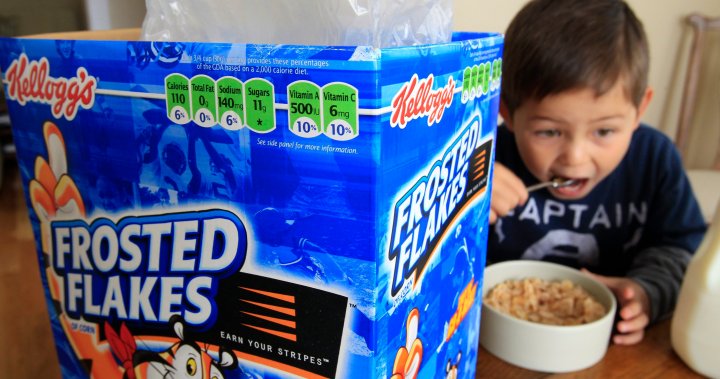Kellogg’s is stirring the pot with a quirky dinner idea to save money on food: cereal.
But before you grab the milk, health experts are cautioning that this unconventional dinner choice might not be as whimsical for your health as it sounds.
In a CNBC interview last week, Kellogg’s CEO Gary Pilnick offered a tip to cash-strapped consumers: swap out traditional dinners for cereal to save on grocery costs.
“The cereal category has always been quite affordable, and it tends to be a great destination when consumers are under pressure,” Pilnick said in the interview. “We’re advertising about cereal for dinner… that’s going to be much more affordable.”
He added that he believes cereal for dinner “is more on trend now” and expects it will continue as consumers continue to grapple with their bills.
As grocery prices continue to steadily rise, Canadian consumers are opting more frequently for cheaper food options, neglecting to prioritize the nutritional value of their purchases, according to an October 2023 poll by Agri-Food Analytics Lab.

And ready-to-eat-cereals, like Fruit Loops, Rice Krispies and Frosted Flakes, have not been immune to inflation. Between January 2023 and January 2024, breakfast cereal was up 2.9 per cent in price, according to Statistics Canada.
“Sugary cereals are very expensive,” said Carol Dombrow, registered dietician and nutrition consultant with the Canadian Heart and Stroke Foundation. “Having oatmeal, for example, would be much less expensive. Having eggs would be much more economical than having sugary cereals for dinner.”
According to Health Canada, some breakfast cereals may provide key vitamins and minerals, when they are fortified with thiamine, niacin, vitamin B6, folic acid, magnesium, iron and other minerals.
Despite the presence of some nutrients, Dombrow cautioned against making cereal a nightly dinner choice, especially those laden with sugar and sodium.
Dombrow’s primary concern regarding the promotion of cereal for dinner is the heavy marketing of these sugary foods to children.
The latest health and medical news
emailed to you every Sunday.
For example, last year Kellogg launched a commercial, promoting cereals like Frosted Flakes and Fruit Loops for a family dinner.
Dombrow says commercials of this nature specifically appeal to children, promoting the consumption of sugary cereals for dinner. Given that sugary breakfast cereals are typically ultra-processed, containing high levels of sugar, fat, and salt, she cautioned that this approach only reinforces unhealthy eating habits.
“The concept is interesting… breakfast for dinner. There’s really nothing wrong with it. What’s wrong is having a sugar cereal as the centre of your plate, as you’re not getting a balanced diet,” she said. “And it’s something that, too much is associated with so many diseases like heart disease and stroke and diabetes and obesity.”
A 2017 report by the Public Health Agency of Canada (PHAC) found that child-targeted cereals were significantly higher in both sodium and sugar. Child-targeted cereals were also significantly lower in fibre as well as protein.
Overall, the most common first ingredient was oats, while sugar was the most common second and third ingredient for cereals targeted towards children.
“The high sugar levels in children’s breakfast cereals is worrisome given that research has shown that sugar consumption, especially added sugars, is directly related to obesity,” the PHAC report said.
The cereal advertised in the commercial, such as Fruit Loops, fall under ultra-processed food, Dombrow said.

Ultra-processed foods are defined as products comprised largely of substances like sugar, fat, salt and additives, with little to no intact food. They’re highly refined and have almost no nutritional benefit, and are marketed as a convenient choice. These include breakfast cereals, potato chips and pop drinks.
Not only can these types of food lead to obesity, cancer and cardiovascular issues, but a 2023 report by the British Medical Journal found that ultra-processed foods can be highly addictive.
Almost half (46 per cent) of total daily calories consumed by Canadians come from ultra-processed foods, according to a 2015 Statistics Canada report. The report shows that children and youth were the highest consumers, with more than 50 per cent of their diets made up of ultra-processed foods.
“Those are the types of foods we don’t want to eat. We want to eat whole foods, we don’t want to have ultra-processed foods. And something like a sugary cereal is definitely ultra-processed,” Dombrow said.
Healthier, cheaper options
Dombrow acknowledges the financial strain many Canadians face due to the escalating cost of living. Because of this, she believes that occasionally opting for a quick bowl of whole-grain cereal for dinner (when rushing to soccer practice) isn’t problematic.
However, she said there are other quick, healthier options available, including whole grain oatmeal, eggs with broccoli, and a slice of whole wheat toast.
“It doesn’t have to be complicated or take some time to prepare,” she said. “But you’re looking for balance, for protein, vegetable, fruit and whole grain carbohydrates. We want kids to get their nutrients, and we want them to get it from whole foods.”

Canada’s Food Guide recommends aiming to fill half of your plate with fruits and vegetables, a quarter with whole grains and another quarter with protein, while also advising to limit consumption of highly processed foods.
For healthy meal ideas, you can head to Canada’s Food Guide recipe index or easy and healthy meal ideas from the Heart and Stroke Foundation.










